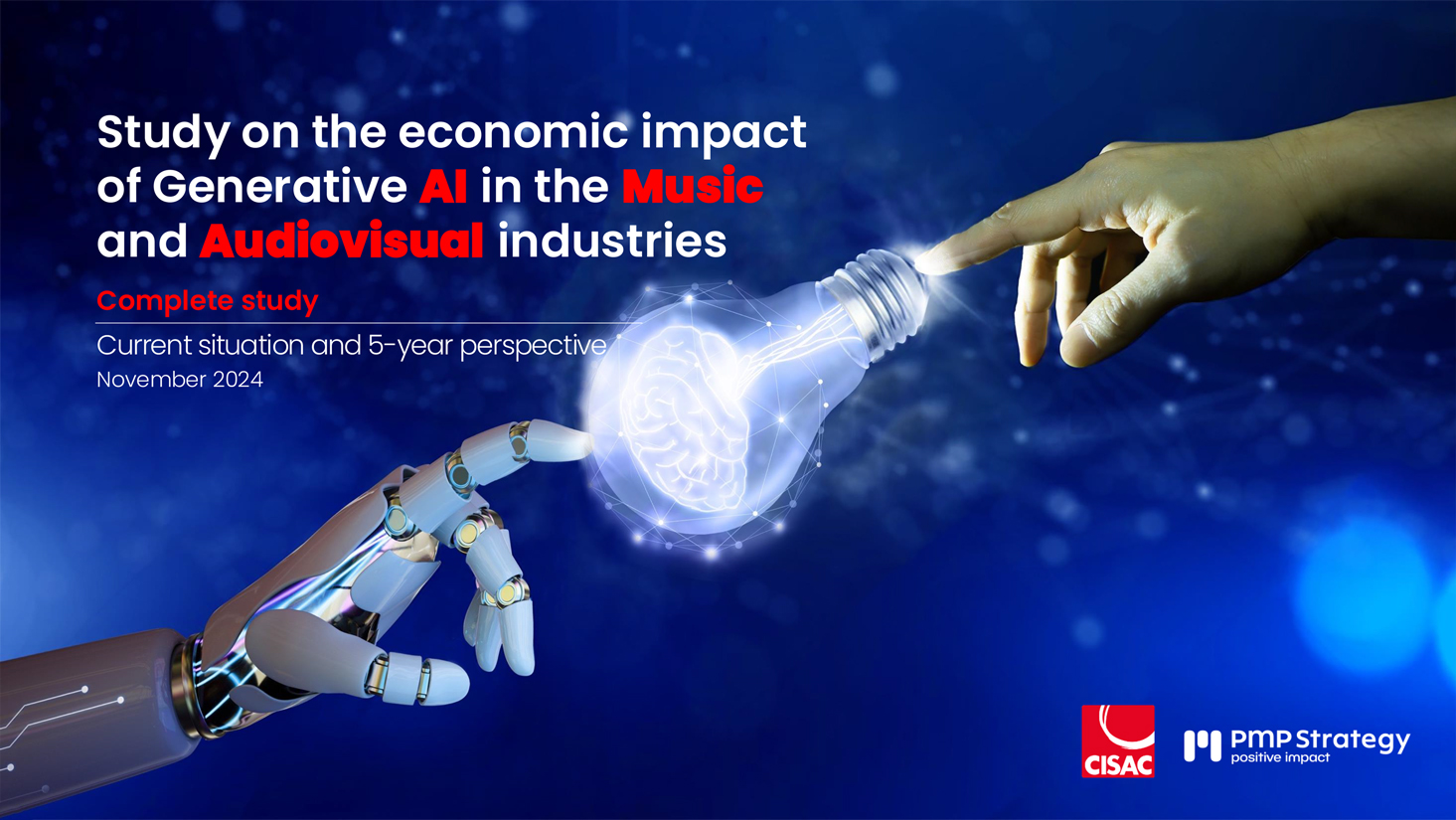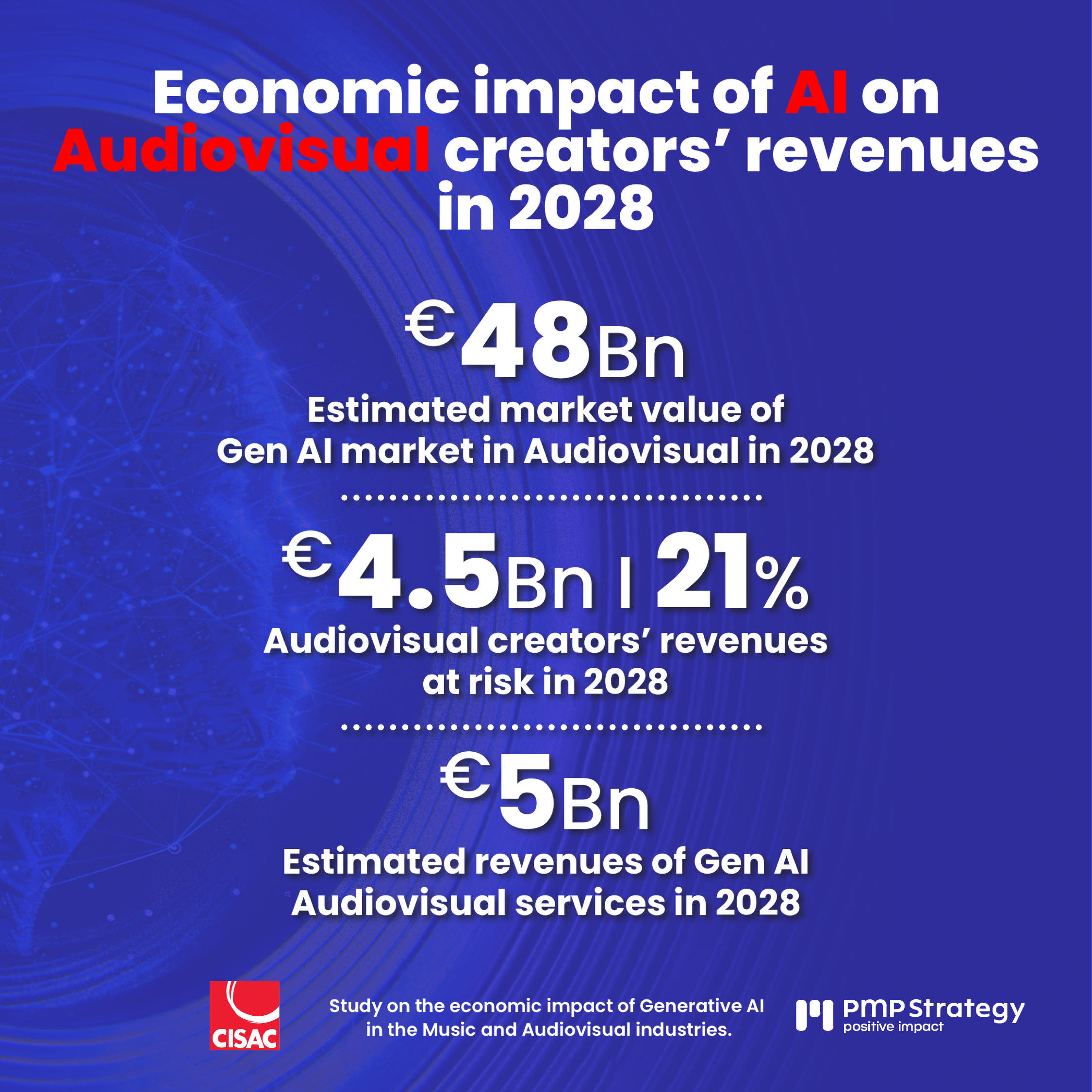The first international study by CISAC estimates a potential €4.5 billion loss in audiovisual authors’ revenues due to generative ai over the next five years

The International Confederation of Societies of Authors and Composers (CISAC), which represents more than 5 million creators, has published the first independent report analyzing the economic impact of Generative Artificial Intelligence (AI) on the music and audiovisual industries.
The report forecasts that technology companies will earn millions in revenue at the expense of authors. Specifically, it is estimated that, in the next five years, audiovisual creators will suffer a 21% income loss.
DAMA has been an active role of the study, participating in audiovisual working groups that brought together more than 50 international experts.
The data from the report, “Study on the Economic Impact of Generative AI in the Music and Audiovisual Industries,” prepared by the strategic consultancy PMP Strategy, was presented yesterday in Paris. DAMA board member and current Vice President of CISAC, Ángeles González-Sinde, summarized the key findings: “This study highlights the need for ethical and economically sound policies that put creators’ rights at the very centre of the AI world. AI tools can profoundly support our work as story tellers and film makers. But there is an enormous anxiety that in the rush to exploit and monetise generative AI, creators will be treated like an afterthought, lacking the right to authorise uses of their work, unprotected by transparency rules and unable to receive fair remuneration. We must not forget that it is human creators who provide the fuel of the AI world and who must be at the centre of policy making and regulation”.
CISAC President Björn Ulvaeus has welcomed the study as a guideline to policy makers in legislative debates around the world. “For creators of all kinds, from songwriters to film directors, screenwriters to film composers, AI has the power to unlock new and exciting opportunities – but we have to accept that, if badly regulated, generative AI also has the power to cause great damage to human creators, to their careers and livelihoods. Which of these two scenarios will be the outcome? This will be determined in large part by the choices made policy makers, in legislative reviews that are going on across the world right now. It’s critical that we get these regulations right, protect creators’ rights and help develop an AI environment that safeguards human creativity and culture.”
CISAC Director General Gadi Oron said: “CISAC commissioned this study from PMP Strategy to show the enormous value that copyright works bring to Gen AI companies. Its conclusions point to a fundamental flaw that is opening up in the market, with creators’ works being unfairly and unethically appropriated to boost the revenues of Gen AI providers, while leaving the creators themselves out of this growth. There is a critical message here for policy makers: they must act urgently to safeguard human creators, culture and creativity. They must ensure that human creators are protected, can exercise their legal rights and can demand transparency from AI services. With these principles enshrined in the AI environment, this can be a win-win for creators and the tech industry rather than a threat to our culture and creative sector”.
Quantifying the Impact of Artificial Intelligence
This is the first global report to quantify the income losses of authors resulting from this major technological revolution. Based on a methodology involving more than 50 international experts, including DAMA, the study seeks to answer three major questions looking ahead to 2028: What presence will AI-created works have in the audiovisual and music markets? What revenues will developers of these technologies generate? And what revenues will creators receive?
In economic terms, the report highlights the immense impact of generative AI, for which spectacular revenue growth is projected for its providers over the next five years. However, this progress poses a significant risk to human creators, who could lose up to 24% and 21% of their income in the music and audiovisual sectors, respectively, by 2028. This decline represents a cumulative loss of €22 billion over five years: €10 billion in the music sector and €12 billion in the audiovisual sector.
On the other hand, the market for AI-generated content will experience exponential growth, increasing its value from the current €3 billion to €64 billion by 2028. As a result, the annual revenues of generative AI providers will reach €4 billion in music (compared to €100 million in 2023) and €5 billion in audiovisual (compared to €200 million in 2023). These figures reflect a transfer of economic value from creators to AI companies, driven by the unauthorized reproduction of creative works.
According to the study, the impact on the audiovisual industry will be significant: translators and adapters of dubbing and subtitles could see their incomes reduced by up to 56%, while screenwriters and directors could face estimated losses of between 15% and 20%.

Key Findings of the Study
The study warns that, without an appropriate regulatory framework, creators will see their income significantly diminished due to the unauthorized use of their works by generative AI models and the competition from AI-generated products. Björn Ulvaeus, President of CISAC, emphasized the importance of protecting creators’ rights and ensuring that AI is regulated in a way that preserves human creativity and culture, warning that the future of creators will depend on key legislative decisions. “This will be the greatest revolution the creative sector has ever seen, and it cannot be that only tech companies and legislators are at the decision-making table.”
Gadi Oron, CISAC Director General, pointed out that the study shows how protected works are being unfairly exploited to generate revenue for AI companies, excluding creators from the economic benefits. He stressed the need for transparency and urgent measures to protect creators, ensuring an ethical and balanced AI environment.
Download the Documents
The Study
Executive Summary
Study in the Media
“AI will displace Rosalía and Taylor Swift on spotify by 2028” (La Razón)
“AI threatens musicians’ revenues” (Expansión)
“Abba’s Björn Ulvaeus warns of AI threat to musicians’ revenues” (Financial Times)
“Global economic study shows human creators’ future at risk from generative AI” (Fox 44 News)

